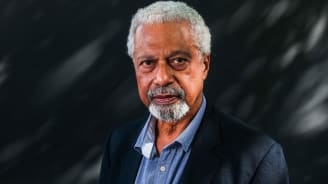
The Nobel Prize in literature has been awarded to the novelist Abdulrazak Gurnah, for his “uncompromising and passionate” portrayals of the effects of colonialism.
Gurnah was born in Tanzania in 1948 but moved to England at a young age. He has written 10 novels, many of which focus on the refugee experience.
His 1994 novel “Paradise,” which told the story of a boy growing up in Tanzania in the early 20th century, won the Booker Prize and marked his breakthrough as a novelist.
“Gurnah’s dedication to truth and his aversion to simplification are striking,” the Nobel Committee for Literature said in a statement. “This can make him bleak and uncompromising, at the same time as he follows the fates of individuals with great compassion and unbending commitment.”
His 2001 book “By the Sea” follows a refugee living in a British seaside town. And his most recent work, “Afterlives,” picks up the narrative of “Paradise” and takes place during the German colonization of Africa.
His characters “find themselves in a hiatus between cultures and continents, between a life that was and a life emerging; it is an insecure state that can never be resolved,” the committee said.
Prior to his retirement Gurnah, 73, was also a professor of English and Postcolonial Literatures at the University of Kent in England.
Nobel Prize in physics awarded to scientists whose work warned the world of climate change
Nobel Prize in physics awarded to scientists whose work warned the world of climate change
The committee’s decision to recognize a writer whose works tackle the themes of displacement, asylum and migration comes amid a years-long migrant crisis in Europe that has intensified during the Covid-19 pandemic.
“I don’t think the acute situation right now in Europe and around the Mediterranean has affected this prize because the phenomenon of exile and migration has been there for many years,” Anders Olsson, chair of the Nobel literature committee, told reporters after the award was announced on Thursday.
“But it is quite clear that his writings are extremely interesting and powerful right now in Europe and around the world,” Olsson added.
“We are affected by what is happening in the world and it would be very strange otherwise.”
Previous winners of the literature prize include the French philosophers Jean-Paul Sartre and Albert Camus, British playwright Harold Pinter, and novelists including John Steinbeck, Toni Morrison and Kazuo Ishiguro.
It was more controversially won by the singer Bob Dylan in 2016, while the committee was criticized for giving the 2019 title to Austrian writer Peter Handke despite controversial past comments about the Yugoslav Wars of the 1990s.
The first Nobel laureate in literature was French poet Sully Prudhomme, winner of the inaugural prize in 1901.
This is the fourth Nobel accolade to be given out this week, after the awarding of the three science prizes. The winner of the peace prize will be announced on Friday. (CNN)















